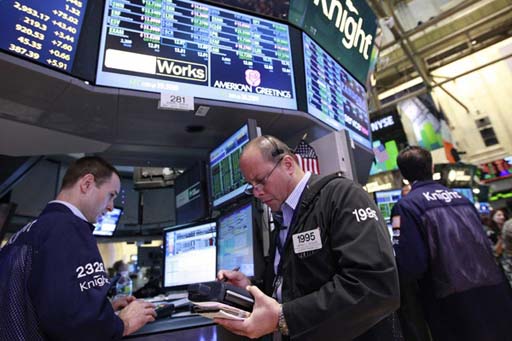Eurocrash: market intelligence
Tuesday 4 September 2012
This, unless you know different, is one of the first attempts to do this - even though the EU is moving in - and reflects how serious a problem it has become. This analysis published by the School of Accountancy in Singapore, sets out some of the problems, under the title "The Dark Side of Trading". A more straightforward piece is here from Time Magazine earlier last month. There is very little being written out this in the British press, and you have to go back to April 2010 to find the Failygraph reporting that the practice was to be scrutinised by the Committee of European Securities Regulators (CESR). However, with as much as 70 percent of trading on some markets carried out automatically by computer, this has a huge distorting effect on the way markets operate and the signals being sent. Despite this, when it comes to market analysis, one still sees various indices reported daily with much reverence, together with commentators intoning on the significance of their movements. But one gets no sense that the average hack is aware that, in the main, they are charting the activity of computer algorithms, which have no other purpose than to make money - and in a very different way from traditional market operation. To then attribute any "intelligence" to this process, much less draw political conclusions from market "sentiment" seems to me more than a little unsound. Whatever messages the markets once were sending us are now heavily distorted as machines take over more and more of the process, leaving human beings on the margins. Thatcher, amongst others, might have said that you can't buck the markets, but the markets of today are very different. The trading patterns of today have their dangers and the use of data as economic – and especially political – tools is not to be relied upon. I'll pick up the threads of the mainstream eurocrash in the morning. COMMENT THREAD Richard North 04/09/2012 |
Regional politics: self awareness from Brogan
Monday 3 September 2012
"Worth reminding ourselves", writes Benedict Brogan, "that the reshuffle is no more than a Westminster circus. We will get excited about it, but the caravan will soon move on. What really matters is Mr Cameron's economic package, due on Thursday along with a speech from the PM".
Of course, what really matters is the eurocrisis, which in the longer term is probably going to have far more impact on the British economy than anything Mr Cameron or his minions will do. But then, you can only push self-awareness so far. Getting Brogan to look outside his Westminster bubble is a bit too much to ask. COMMENT THREAD Richard North 03/09/2012 |
Eurocrash: all Draghi has left is words
Monday 3 September 2012
The markets are getting excited about Thursday's meeting of the ECB's governing board, so much so that even The Guardian is moved to comment.
It cites Michael Hewson, senior market analyst at CMC Markets UK, who reminds us that the Karlsruhe judgement won't be ready until 12 September, and ECB officials have already indicated that they will wait for that before unleashing the Draghi plan.Actually, that was picked up by Handelsblatt on 24 August, which suggested that it could then take a month or more to digest the judgement. This, it would seem, renders completely pointless the current flurry of interest. Even then, the German government is bringing out the big guns, with Schäuble speaking on German radio to warn against "excessive expectations of the ECB". The German finance minister is convinced, we are told, that the ECB will not make decisions that fall outside its mandate. The Federal Government's position is clear, he said once again: "sovereign debt may not be financed by monetary policy". And singing from the same hymnsheet (for once) is Philipp Rösler, who has come out in support of Jens Weidmann in his "lonely battle" against the ECB, declaring that the ECB must be " limited to its mandate to ensure monetary stability". He adds: "Bond purchases cannot remain a permanent solution as they drive the danger of inflation". Weidmann also gets backing from Lutz Goebel, president of the powerful Association of Family Businesses, stating that ECB bond purchases would not reduce the risks to investors. "They would just be hidden in the basement of the central bank", he says. However, Financial Times Deutschland is beginning to smell a rat. In a lengthy article, it questions whether the spat between Weidmann and the ECB is real. Peter Ehrlich for the newspaper argues that Asmussen and Weidmann have a common goal, the euro rescue, and they are personal friends. Is the apparent enmity between the two, "all just a big bluff in the political power game?" Ehrlich is not the first to be suspicious. A week ago we saw Hans-Olaf Henkel in Handelsblattsuggest that there was an element of shadow boxing going on. As long as it is theatre, it seems, this suits Merkel's interests, but it also seems that Weidmann has a "bazooka" of his own. The Bundesbank's ultimate weapon would be to take the ECB before the European Court for going beyond its mandate. This is regarded as a nuclear option, so disruptive that it could scarcely be used. But the threat remains, a bankers' form of mutually assured destruction. That rather gives game, set and match to Weidmann but, as Börsen Zeitung observes, Draghi still has to deliver. But, since he cannot give the markets their bond purchases, he will have to choose his words with care, says the paper. And that might he all he has – just words. COMMENT THREAD Richard North 03/09/2012 |
Tuesday, 4 September 2012
Posted by
Britannia Radio
at
08:35
![]()
























